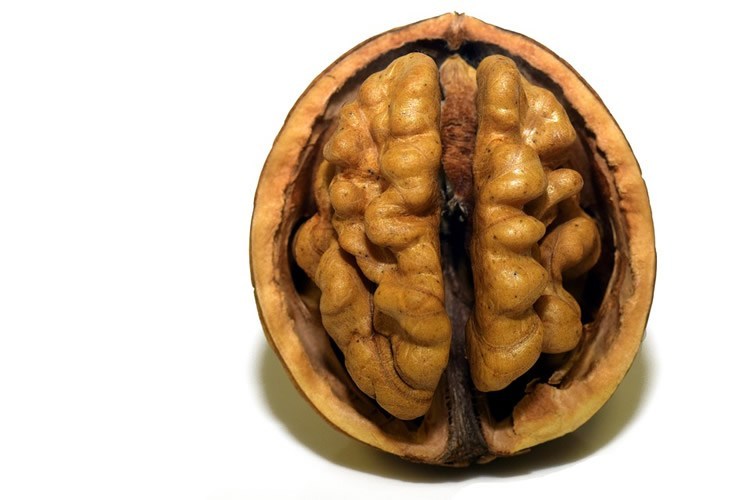Learn about brain health and nootropics to boost brain function
A nutty solution for improving brain health

Summary: Eating more than 10 grams of nuts a day has been linked to improved cognitive function, by up to 60%, in older adults.
Source: University of South Australia
Long-term, high nut consumption could be the key to better cognitive health in older people according to new research from the University of South Australia.
In a study of 4822 Chinese adults aged 55+ years, researchers found that eating more than 10 grams of nuts a day was positively associated with better mental functioning, including improved thinking, reasoning, and memory.
Lead researcher, UniSA’s Dr. Ming Li, says the study is the first to report an association between cognition and nut intake in older Chinese adults, providing important insights into increasing mental health issues (including dementia) faced by an aging population.
“Population aging is one of the most substantial challenges of the twenty-first century. Not only are people living longer, but as they age, they require additional health support which is placing unprecedented pressure on aged-care and health services,” Dr. Li says.
“In China, this is a massive issue, as the population is aging far more rapidly than almost any other country in the world.
“Improved and preventative health care – including dietary modifications – can help address the challenges that an aging population presents.
“By eating more than 10 grams (or two teaspoons) of nuts per day older people could improve their cognitive function by up to 60 percent- compared to those not eating nuts – effectively warding off what would normally be experienced as a natural two-year cognition decline.”
China has one of the fastest growing aging populations. In 2029, China’s population is projected to peak at 1.44 billion, with the ratio of young to old dramatically imbalanced by the rising ranks of the elderly. By 2050, 330 million Chinese will be over age 65, and 90.4 million will be over age 80, representing the world’s largest population of this most elderly age group.

More broadly, the World Health Organization says that by 2020, the number of people aged 60 years and older will outnumber children younger than five years old.
The UniSA study analyzed nine waves of China Health Nutrition Survey data collected over 22 years, finding that 17 percent of participants were regular consumers of nuts (mostly peanuts). Dr Li says peanuts have specific anti-inflammatory and antioxidant effects which can alleviate and reduce cognitive decline.
“Nuts are known to be high in healthy fats, protein, and fiber with nutritional properties that can lower cholesterol and improve cognitive health,” Dr Li says.
“While there is no cure for age-related cognitive decline and neurogenerative disease, variations in what people eat are delivering improvements for older people.”
The World Health Organization estimates that globally, the number of people living with dementia is at 47 million.
By 2030, this is projected to rise to 75 million and by 2050, global dementia cases are estimated to almost triple. China has the largest population of people with dementia.
“As people age, they naturally experience changes to conceptual reasoning, memory, and processing speed. This is all part of the normal aging process,” Dr Li says
“But age is also the strongest known risk factor for cognitive disease. If we can find ways to help older people retain their cognitive health and independence for longer – even by modifying their diet – then this absolutely worth the effort.”
Source:
University of South Australia
Media Contacts:
Annabel Mansfield – University of South Australia
Image Source:
The image is adapted from the University of South Australia news release.
Original Research: Closed access
“A Prospective Association of Nut Consumption with Cognitive Function in Chinese Adults Aged 55+ _ China Health and Nutrition Survey”
Li, M. & Shi, Z. J Nutr Health Aging (2019) 23: 211. doi:10.1007/s12603-018-1122-5
Abstract
A Prospective Association of Nut Consumption with Cognitive Function in Chinese Adults Aged 55+ _ China Health and Nutrition Survey
Objectives
We aimed to investigate the association of nut intake with cognitive function in Chinese adults aged 55 and over.
Design
This was a prospective open cohort study with repeated measurements of diet and cognition scores.
Participants/settings
4822 adults aged 55 and over participating in the China Health Nutrition Survey during 1991–2006.
Measurements
Global cognitive function measured repeatedly in 1997, 2001, 2004, and 2006 using a subset of modified Telephone Interview for Cognitive Status; poor cognitive function was defined as cognition score<7. Nut consumption was collected using 3-day 24 recall method in 1991, 1993, and at surveys of cognition assessment.
Statistical analyses performed
Multilevel mixed effect linear regression and logistic regression analysis were conducted to assess the association with cognitive function.
Results
The unadjusted cognitive score decreased by 0.29 (95% CI 0.22–0.28) with one-year aging during 1997–2006. Nut intake of more than 10g/d was associated with higher cognition score by 0.63 points (95% CI 0.15–1.12) or 40% less likely to have poor cognitive function (OR 0.60, 95% CI 0.43–0.84) after adjusted for demographic, lifestyle behavioural, BMI, and energy intake.
Conclusions
Nut consumption was inversely associated with cognition decline.
Click here to view full article